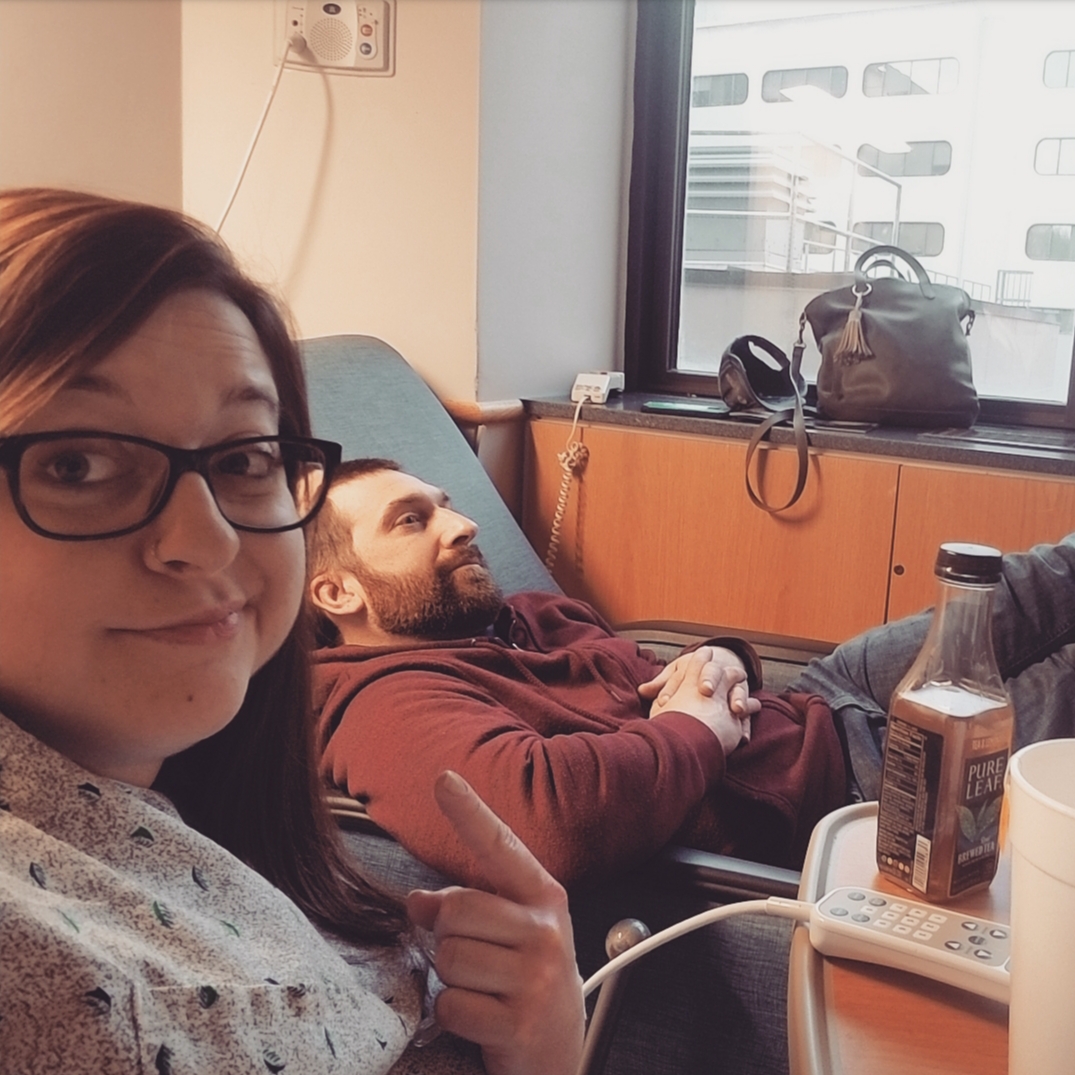Ileostomates Andy and Sandee began their life adventures at a national ostomy conference 19 years ago.
By Ed Pfueller, UOAA Communications & Outreach Manager
When Andy Kyriacou stood up to ask a question of a panelist at the 2004 United Ostomy Association (UOA) Conference in Kentucky, he got more then just a good answer. He inadvertently found a new life partner.
The session was about dating and designed for single ostomates. Sandee Prechtel was on the panel and brought the perspective of dating again after losing her husband of 39 years. Andy, who became a widow losing his longtime wife the previous year, asked about her experience dating again after, now with an ostomy.
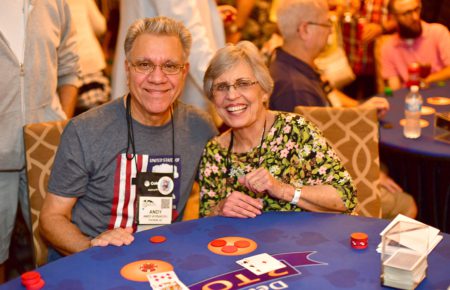
Andy and Sandee at the 2019 UOAA National Conference in Philadelphia. The couple met at a conference in 2004 and have not missed a conference since.
“Well, you kiss a lot of frogs before you find a prince,” Sandee recalls saying. They remember it being a great panel discussion that encouraged the audience to be confident in themselves.
During the rest of the conference, the pair would run into each here and there and chat briefly before sessions. “She was very easy to talk to,” Andy remembers.
As is tradition at UOA and now UOAA conferences, the closing night party ended with dancing. Andy asked Sandee to dance, and a small spark kindled. They danced the last dance of the evening.
“I did not want the evening to end so asked her to go for a walk along the Ohio River,” Andy remembers. “We walked and talked from around midnight to 1-2 am.”
They talked about life goals, former spouses, aspirations, and soon realized they had much in common. “We found out we both had two adult children and were in longtime marriages,” Sandee says.
“Well, you kiss a lot of frogs before you find a prince”
Andy was living in Connecticut and Sandee in Arizona so they exchanged emails and made tentative plans to attend the next conference the following year. Once they started emailing and talking on the phone, however, it became clear they’d want to see each other before the next conference.
“Sandee invited me to Tucson for New Years Eve, 2005 and I figured it would be either the longest or shortest few days, depending on how it went,” Andy remembers. Andy had a chance to meet her kids and it became clear their relationship would be more then just a friendship. “We planned future rendezvouses right after that,” Andy says. The long-distance relationship was a fit for their mutual love of travel and in 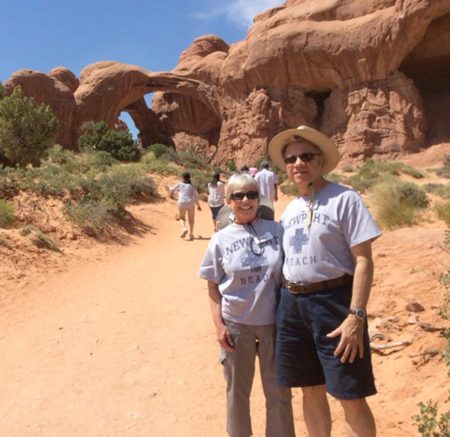 the next few years they met up in New Orleans, Virginia, Cleveland, Hartford and of course at the next UOA conference in 2005 in Anaheim.
the next few years they met up in New Orleans, Virginia, Cleveland, Hartford and of course at the next UOA conference in 2005 in Anaheim.
When UOA annual conferences morphed into UOAA biennial conferences, they kept on attending to see each other and the many friends they have made over the years.
“It really is a life changing experience you can’t find anywhere else to be among that many ostomates and their partners. You have no idea who has an ostomy and who does not,” Sandee says. “There is always something new to learn, we look forward to going to explore all the new cities and locations.”
Both are also active volunteers in their local ostomy support groups in Hartford and Tucson. Andy served as Vice President in his group, Sandee was President of her group. At the 2017 National Conference in Irvine, Sandee was awarded the Affiliated Support Group Leadership Award by UOAA for her exemplary service to her local ostomy community.
“I did not want the evening to end so asked her to go for a walk along the Ohio River”
She is particularly proud of the informal and well attended new ostomate monthly meeting her group has been hosting for many years. “The tips they receive are really important in their recovery,” Sandee says. If a new ostomate has questions or concerns about dating and relationships the couple is happy to share their personal story.
Sandee has since stepped back from an ASG leadership role but Andy is quick to point out, “She is the glue that holds everything together.” When Andy retired in 2007 the couple began to split their time between Connecticut and Arizona.

In 2012 knowing that Sandee loves heart shaped rings, they picked out a diamond ring and Andy got down one knee. Though not married on paper, they are committed life partners. They continue to always be up for new adventures.
“We’ve never been to Houston, we’re really looking forward to it!” They both say about UOAA’s 8th National Conference this August. “And As long as we are physically able to, we plan to keep going to each one.”
It will be 19 years since that fateful connection in Kentucky. We’ll save the last dance for them again this year in Houston and ask Sandee if she thinks she has found that prince.

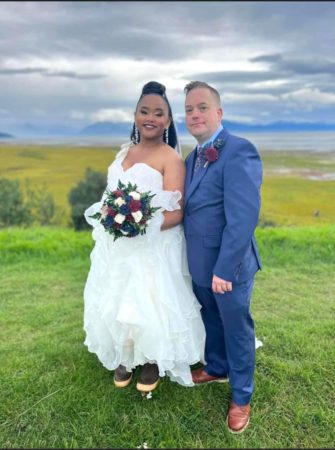 shining, a distant mountain range framed their joy – the chilly Alaskan rain held off.
shining, a distant mountain range framed their joy – the chilly Alaskan rain held off.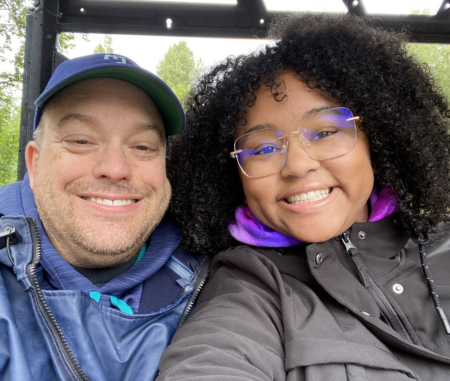
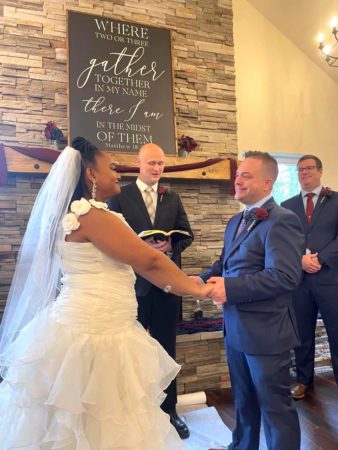 Caregiving has been a consistent part of Taylor and Michael’s relationship. “When Michael had to have revision surgery, I wanted to make sure he’d have easily accessible food so he could focus on healing. I came over to his house prior to surgery and we made a few different meals to freeze. It was a great feeling for me that we got to spend time together cooking and his food would be taken care of while he recovered. He was used to taking care of himself so it meant a lot to me to do this for him.”
Caregiving has been a consistent part of Taylor and Michael’s relationship. “When Michael had to have revision surgery, I wanted to make sure he’d have easily accessible food so he could focus on healing. I came over to his house prior to surgery and we made a few different meals to freeze. It was a great feeling for me that we got to spend time together cooking and his food would be taken care of while he recovered. He was used to taking care of himself so it meant a lot to me to do this for him.”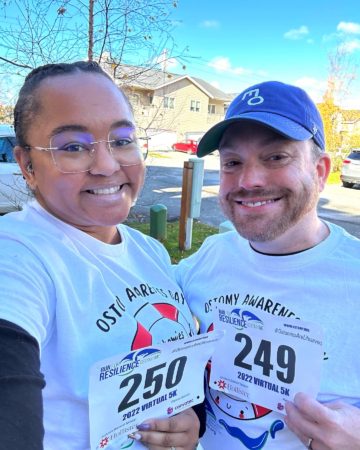 Even with partner support, Taylor says “UOAA has been so incredibly important to me in my ostomy journey. When I first got my ostomy, I scoured the UOAA website and read every piece of information I could find which helped ease my mind and answer my questions. UOAA’s website also helped me to be able to share information about my ostomy with family and friends.”
Even with partner support, Taylor says “UOAA has been so incredibly important to me in my ostomy journey. When I first got my ostomy, I scoured the UOAA website and read every piece of information I could find which helped ease my mind and answer my questions. UOAA’s website also helped me to be able to share information about my ostomy with family and friends.”